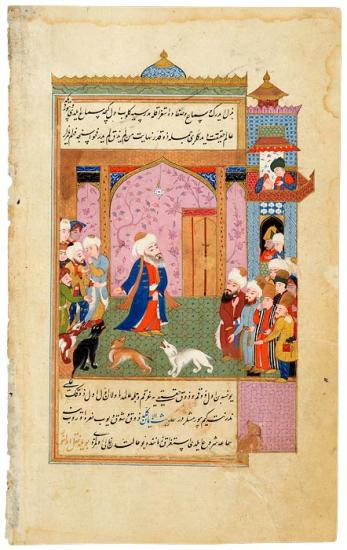
Dogs in a Market Listen to Rūmī, Who Praises their Understanding and Attention
Tarjuma-i Thawāqib-i manāqib (A Translation of Stars of the Legend), in Turkish
The translation was ordered in 1590 by Sultan Murād III (r. 1574–95) from the Persian abridgement of Aflākī.
Purchased by Pierpont Morgan, 1911
Several dogs in the foreground listen to a speech by Rūmī, who, pointing to the dogs, addresses a crowd in a courtyard. While dogs were generally not highly esteemed, Rūmī praises their understanding and attention, calling them "relatives of the dog of the Seven Sleepers" and reciting a distich (two-line verse) about love and paradise. Unlike the Christian story of the "Seven Sleepers of Ephesus," who were walled up in a cave, the version in the Qur˒an (sura 18: 9–6) includes a faithful dog that kept watch at the entrance while the youths slept. Seeking refuge from persecution by Decius, seven Christian youths hid in a cave, where they fell asleep. The emperor then sealed the cave. When it was opened several centuries later, the youths awoke, thinking only a night had passed.
This miniature is part of a sixteenth-century manuscript account of the life and miracles of the Persian poet and mystic known as Rūmī. It is a Turkish translation of an abridged version of the original fourteenth-century Persian account by the dervish known as Aflākī.
Rūmī, Persian Mystic And Poet
The sixteenth-century miniatures presented here concern the life and miracles of Jalāl al-Dīn Rūmī, called Mē vlāna (Our Master), the most famous member of the Mevlevī order and Persia's greatest Sufi mystic and poet. He was born in Balkh in 1207, but his family emigrated after his father foresaw the Mongol conquest. They eventually resettled in Konya, Turkey, then the capital of Anatolian Rūm (thus Rūmī), where the poet died on 17 December 1273.
Several Persian accounts of Rūmī's life have been written, the first by his son, Sultan Walad. The third, laden with moralizing miracle stories, was ordered by Rūmī's grandson Ulu ˓Ārif Chelebi. It was written by the dervish Shams al-Dīn Aḥmad, called Aflākī (d. 1360). Aflākī also incorporated verses from Rūmī's works, notably his six-volume Masnavī (a poetical form of rhyming couplets) and the Dīvān-i-Shams al-Dīn Tabrīzī, named after Shams of Tabriz, the mystic who changed Rūmī's life and transformed him into a poet when they met in 1244.
In 1590—three and a half centuries after Aflākī wrote his life of Rūmī—the Ottoman sultan Mūrad III ordered a Turkish translation of a 1540 abridged version of Aflākī's text entitled Tarjuma-i Thawāqib-i manāqib (Stars of the Legend). The translator was Darvīsh Mahmud Mesnevī Khān of Konya. Two illustrated copies of the Murād translation, both made in Baghdad, survive. One, dated 1599, is held by Topkapi Palace, Istanbul, and has twenty-two miniatures. The other, richer manuscript is held by the Morgan. It dates to the 1590s and includes twenty-nine miniatures. They are all featured here, along with two folios from other collections that are believed to have once been part of the Morgan manuscript.
